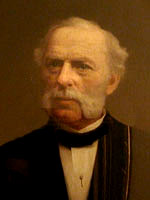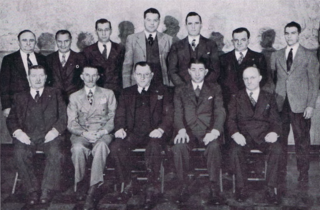
Holyoke is a city in Hampden County, Massachusetts, United States, that lies between the western bank of the Connecticut River and the Mount Tom Range. As of the 2020 census, the city had a population of 38,328. Located 8 miles (13 km) north of Springfield, Holyoke is part of the Springfield Metropolitan Area, one of the two distinct metropolitan areas in Massachusetts.

Thomas Talbot was an American textile mill owner and politician from Massachusetts, United States. Talbot ran a major textile business, involving chemical dyeworks and the weaving of fabric, in Billerica that was a major local employer. As a Republican, he served in the state legislature, on the Massachusetts Governor's Council, and as Lieutenant Governor before serving for one partial term as Acting Governor of Massachusetts, and later for one full term as the 31st Governor.
Falco F.C., commonly known as the Holyoke Falcos, was an American soccer club based in Holyoke, Massachusetts, that was a founding member of the professional American Soccer League, but withdrew at the end of the first season. The team was sponsored by the Farr Alpaca Company, a local textile mill.
Shawsheen Indians were a United States soccer club based in Andover, Massachusetts during the early 1920s.
The American Woolen Company is a designer, manufacturer and distributor of men’s and women’s worsted and woolen fabrics. Based in Stafford Springs, Connecticut, the company operates from the 160-year-old Warren Mills, which it acquired from Loro Piana SpA in June 2014.

The North Star Woolen Mill, now the North Star Lofts, is a building in downtown Minneapolis, Minnesota, United States. The building, located in the St. Anthony Falls Historic District, was originally a textile mill for the North Star Woolen Company. The mill was built in 1864 by W.W. Eastman and Paris Gibson on the west side of the west side canal. High quality wool blankets, scarves, flannels, and yarns were manufactured at the facility and it became the nation's largest manufacturer of wool blankets by 1925.

The Bernat Mill, also known as Capron Mill, and later Bachman Uxbridge Worsted Company, was an American yarn mill in Uxbridge, Massachusetts, that was for the most part destroyed by fire on July 21, 2007.

Daniel Day was an American pioneer in woolen manufacturing.

Mill Conversion or mill rehab is a form of adaptive reuse in which a historic mill or industrial factory building is restored or rehabilitated into another use, such as residential housing, retail shops, office, or a mix of these non-industrial elements (mixed-use).
Farr Alpaca F.C. was an early twentieth-century American soccer team sponsored by the Farr Alpaca textile mill of Holyoke, Massachusetts. The team competed in amateur leagues in western Massachusetts, but experienced some success in national competitions.

The 1926 Passaic textile strike was a work stoppage by over 15,000 woolen mill workers in and around Passaic, New Jersey, over wage issues in several factories in the vicinity. Conducted in its initial phase by a "United Front Committee" organized by the Trade Union Educational League of the Workers (Communist) Party, the strike began on January 25, 1926, and officially ended only on March 1, 1927, when the final mill being picketed signed a contract with the striking workers. It was the first Communist-led work stoppage in the United States. The event was memorialized by a seven reel silent movie intended to generate sympathy and funds for the striking workers.

Stanley Woolen Mill is the common historic name applied to a defunct company based in southeastern Massachusetts and to the company's buildings which stand at the southern entrance to the Blackstone River and Canal Heritage State Park. The mill is an important footnote in the history of the textile industry in America. Stanley Woolen Mill is the centerpiece of the Central Woolen Mills District which is part of the National Historic Register.

The Assabet Woolen Mill was originally a textile factory complex founded by Amory Maynard in 1847 near the Assabet River in the northern part of what was then Sudbury, Massachusetts. The area became the Town of Maynard in 1871. The business went bankrupt in 1898, but reopened in 1899 as part of the American Woolen Company, which expanded it. The mill ceased operation as a woolen mill in 1950. The buildings were later repurposed by Digital Equipment Corporation (DEC) as its corporate headquarters. As of 2015, the facility is host to various small business as "Mill & Main". See Maynard, Massachusetts for further details regarding the use of the dozen or so mill buildings.

Dennie L. Farr was an American businessman and politician from Holyoke, Massachusetts. Born in Chesterfield, New Hampshire on November 29, 1861, to Lark L. and Mary Farr, he attended school at Newark, Bellow's Falls, and Westminster, Vermont, and Swanzey, New Hampshire.

The Parsons Paper Company was an American pulp and paper company specializing in cotton-based fine writing papers, based in Holyoke, Massachusetts. Founded in 1853 by Joseph C. Parsons, it was the first and, as of 2023, the last paper manufacturer extant in that city, from 1989 until its liquidation in 2005. In 2008 the company's primary mill was razed in a large fire.

Despite representing a significantly smaller population than their Irish, French, Polish, or Puerto Rican counterparts, in the late 19th century through the mid-20th century, German immigrants predominantly from Saxony and Rhineland played a significant economic, cultural, and political role in the history of Holyoke, Massachusetts. The influx of these immigrants can largely be attributed to a single mill and millworker complex, the Germania Woolen Mills, which formed the basis of the immigrant colony that would make the ward encompassing the South Holyoke neighborhood that with the highest German population per capita, in all of New England by 1875. Along with unionization efforts by the Irish community, Germans would also play a key role in the city and region's socialist labor movements as workers organized for higher pay and improved living conditions in the textile and paper mill economies.

From the beginning of the city's history as the western bank of Springfield, Irish families have resided in and contributed to the development of the civics and culture of Holyoke, Massachusetts. Among the first appellations given to the city were the handles "Ireland", "Ireland Parish", or "Ireland Depot", after the village was designated the 3rd Parish of West Springfield in 1786. Initially occupied by a mixture of Yankee English and Irish Protestant families, many of whom belonged to the Baptist community of Elmwood, from 1840 through 1870 the area saw a large influx of Irish Catholic workers, immigrants to the United States, initially from the exodus of the Great Famine. During that period Irish immigrants and their descendants comprised the largest demographic in Holyoke and built much of the early city's infrastructure, including the dams, canals, and factories. Facing early hardships from Anti-Irish sentiment, Holyoke's Irish would largely build the early labor movement of the city's textile and paper mills, and remained active in the national Irish nationalist and Gaelic revival movements of the United States, with the Holyoke Philo-Celtic Society being one of 13 signatory organizations creating the Gaelic League of America, an early 20th century American counterpart of Conradh na Gaeilge.
The textile industry in Aachen has a history that dates back to the Middle Ages. The Imperial city of Aachen was the main woolen center of the Rhineland. Certain kind of woolens made there were illustrated as "Aachen fine cloth". These high-quality fine woolens have a plain weave structure using carded merino wool yarns, and a raised surface. The production of high-quality, fine cloth required fine foreign wool and skilled craftsmen and was reserved for town craftsmen. It involved regulated steps including sorting, combing, washing, spinning, fulling, dyeing, shearing, and pressing the wool. The finished products were inspected and authorized with a town trademark before being sold and exported. Fine cloth was a major export in the Middle Ages.














